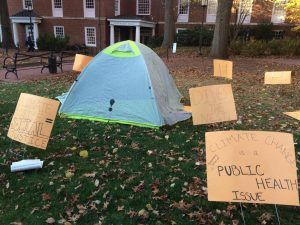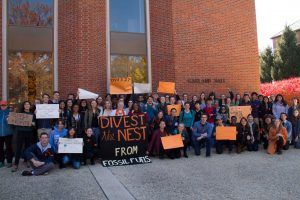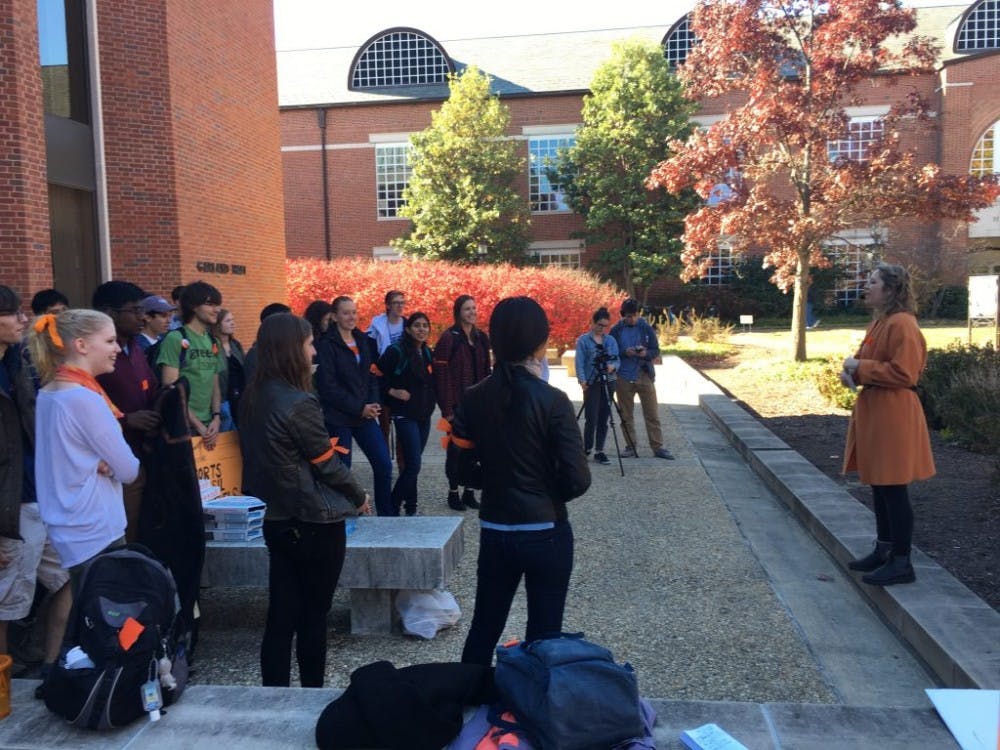Refuel Our Future, a student led fossil fuel divestment campaign at Hopkins, staged a peaceful protest and sit-in on Thursday, Nov. 17 outside Garland Hall. The group demanded that the University respond to their divestment proposal, which demands that the part of its endowment that is invested in fossil fuel companies be eliminated.
Addressing the crowd of students gathered in front of Garland, the president of Refuel Our Future, senior Maggie Weese, described reliance on fossil fuels as an unequal distribution of power. She added that the fossil fuel companies’ strength extends beyond their influence over lobbyists and paid researchers.
“The real power of the fossil fuel industry is that they’ve kept us complacent. They’ve kept the public complacent, and this is an issue that we cannot be complacent on,” she said.
Citing the University’s reputation as a research institution, Weese views the University’s refusal to divest as irresponsible.
“We are a leader in public health. We are a leader in medicine, in education, in international health. We are a leading research institution, and we are the largest employer in Baltimore city,” she said. “Yet, we are investing in industries that are leading us toward climate change. That is a misuse of power.”
Founded four years ago in the Bloomberg School of Public Health, Refuel Our Future has since been working in collaboration with Hopkins faculty members to divest the current endowment’s investments and publicly refuse to invest any more of its portfolio in fossil fuel companies.
In the past, the Board of Trustees convened in the 1980s as a result of a successful campaign from the Johns Hopkins University Coalition for a Free South Africa, which pushed the University to divest from companies associated with apartheid in South Africa. The Board also convened in the 1990s when groups successfully urged the University to divest from tobacco.
Currently, Hopkins has up to $35 million of the endowment directly invested in fossil fuels. In response to Refuel Our Future’s work, the University has reconvened the Public Interest Investment Advisory Committee (PIIAC), an advisory board created by the University’s Board of Trustees to assist them in implementing their Statement on Investment Responsibility Regarding Separately Invested Endowment Funds.
Ultimately, investment decisions still remain solely under the power of the Board of Trustees and its designees.

According to senior Christian Cayon, a member of Refuel Our Future, the group submitted the proposal for fossil fuel divestment in December 2015. Cayon said that 11 months later, the group has yet to receive a final decision on their proposal.
“From what we understand, they’ve been in talks for over a year, but they haven’t kept minutes as they promised us they would,” he said.
Another group member, sophomore Morgan Balster, elaborated on PIIAC’s silence.
“We’re still waiting to hear back from PIIAC, but it’s been almost a year,” Balster said. “That’s why we felt the need to have this [sit-in] to show that we’re not going away. We want an answer. We’re not going to take no as an answer.”
Refuel Our Future is demanding that PIIAC make a decision by Dec. 22. Junior Nina Krauss, another member, said the University has not been transparent during the process.
“We have been nothing but a respectful campaign,” she said. “And we’ve had a lot of bureaucratic push back and we’ve been moved around.”
Cayon argued that the University’s support of fossil fuel companies is hypocritical. He cited the school’s advertising of its sustainability initiatives, like Center for a Livable Future and solar panels on campus and said that its continued investment in corporations like ExxonMobil and Chevron contradict that green image.
“It makes no sense, making the campus green without also greening the portfolio,” he said. “We are demanding consistency from Johns Hopkins University.”
Following the rally, where students chanted “Divest / The Nest / Fossil free is the way to be,” the group of over 60 students moved into Garland Hall where they held a sit-in. Organizers handed out orange felt pins, and many students wore orange clothes or arm bands.
Krauss explained the significance behind the color orange for their movement, which originated from a Canadian campaign.
“Fossil fuel divestment liked the idea of the orange felt because it’s simple and people can have access to it,” she said. “The color orange was chosen because its more than just ‘green.’ Fossil fuel divestment is a social justice issue... It’s orange so we can show that we’re all in solidarity with each other.”
Weese explained that because a wide range of marginalized groups will be disproportionately affected by climate change, all Hopkins affiliates should support the movement.
“It will be women, it’ll be children, people living in the Global South, people living below the poverty line, people of color,” She said. “It’s really not just the fossil fuel industry that’s misusing their power, it’s Johns Hopkins University.”
After the sit-in, Refuel our Future members and allies set up a tent, surrounded by divestment signs, outside of Garland Hall. Refuel Our Future member junior Atlas Elawad said that it was a way for students to show their commitment to the cause.
“It’s a way for us to show them that we’re not going anywhere. Even when your workday is over and you leave, we will still be here,” Elawad said.

The next morning, w and other members who camped outside Garland spoke with administrators as they arrived to work. She said that people asked questions and one administrator asked for an electronic version of their demands to share with his fellow colleagues.
Following Thursday’s demonstration, Refuel Our Future followed up with the PIIAC chair Jeffrey Kahn, who is the director of the University’s bioethics institute. Associate General Counsel for the University Sara Slaff, University President Ronald J. Daniels, Senior Vice President for Finance and Administration Daniel Ennis, and Provost Sunil Kumar were all copied into the message.
In response, Khan wrote that the committee has resumed its work this fall and is taking time for a thorough review of the issues related to fossil fuel divestment. Refuel Our Future and Khan have been in contact, and will be meeting on Monday.
In an interview with The News-Letter, Weese and senior Maddie King, treasurer of Refuel Our Future, accused PIIAC of not being honest or open about how the organization functions.
“They told us in their email that they had met this fall, even though they clearly haven’t replaced one of their members and we’ve heard from members of the committee that they haven’t met and are only planning to meet for the first time in December,” King said.
Currently on PIIAC’s website, Jenny Park, who graduated last semester, is still listed as a member of the committee. The most recently published Committee minutes are from March 2015. King and Weese also raised concern that there is no public timeline regarding the group’s proposal.
Weese described the group’s reaction to Khan’s initial response.
“We felt like they were just saying ‘you need to sit and be patient’ but the reality is, we don’t have time to be patient,” she said. “We feel like they haven’t been working as quickly on this as they should be.”
King stressed that Refuel Our Future does not want to antagonize the University.
“We’re taking this really seriously, we’ve been very cooperative, we want to work with the University because we think that divestment is something that’ll be mutually beneficial,” she said.
Depending on how the University responds, King addressed steps that the group may take going forward. Weese and King said that the group would consider targeting alumni donations, prospective students and ratcheting up pressure from current students and faculty.
“[Responding to] these demands [would be] a demonstration of goodwill from the University to show that they actually are paying attention to us, to show that they respect us, that they take us seriously and are willing to work with us,” King said. “If they ignore those demands, I would really take that as an insult from the University. We’re prepared to work a little more aggressively.”
They followed up by hoping there will be continued cooperation between Refuel Our Future and the University.
“We really do want to work with the University, and we really pride ourselves on the fact that we have in the past. We just don’t feel like they’ve been willing to work with us or be respectful of us,” Weese said.
For Weese, the University’s time to act is now.
“We understand that this is a big decision and that it takes a lot of time to get a lot of important people in the same room, but we don’t have time to wait any longer,” Weese said. “Climate refugees don’t have time to wait any longer. The Maldives don’t have time to wait any longer. Baltimore City does not have time to wait any longer. We need an answer, and we need it now.”





